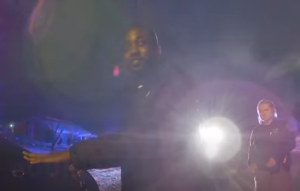Incident Overview
On January 30, 2022, a routine traffic stop by the Zealand Police Department escalated into a controversial event that sparked discussions on civil liberties and potential racial profiling. The incident involved Torion Mitchell, a DoorDash delivery driver, who was stopped by Officer Boer for allegedly driving at 120 mph in a 55 mph speed zone. What seemed like a straightforward traffic violation quickly became a complex situation involving accusations of racial profiling and civil rights violations.

The Traffic Stop
The encounter began when Officer Boer, along with other officers, stopped Mitchell after allegedly clocking him at 120 mph. Mitchell complied with the officers’ instructions, stepping out of his car and undergoing a pat-down. The officers, however, did not stop at issuing a speeding ticket. Instead, they began questioning Mitchell about potential drug use, citing his dilated pupils as a reason for their suspicion. Mitchell, who was visibly nervous, denied any drug use, attributing his dilated pupils to adrenaline and fear of the situation.
Questioning and Sobriety Tests
Despite Mitchell’s denials, the officers continued to press him about drug use, suggesting that his pupils were indicative of narcotics use, specifically heroin or opium. Mitchell offered to take any test to prove he was not under the influence, but the officers remained skeptical. Officer Boer, identifying himself as a drug recognition officer, insisted that Mitchell’s behavior and physical responses suggested drug use.
Mitchell was subjected to several roadside sobriety tests, all of which he passed. These included following the officer’s finger with his eyes, reciting the alphabet, and counting backward. Despite passing these tests, the officers continued to express doubts about Mitchell’s sobriety, questioning him further about his education and background.
Racial Profiling Concerns
As the questioning continued, Mitchell expressed his fear and discomfort, stating that he was nervous because he was a black man in Zealand, Michigan, and feared the potential consequences of the situation. His concerns were met with dismissal by the officers, who assured him there was nothing to worry about as they were all wearing body cameras. However, Mitchell and his supporters later claimed that the extended questioning and suspicion of drug use were rooted in racial profiling rather than any legitimate concern about his driving or sobriety.
Aftermath and Legal Concerns
After the prolonged questioning and testing, Mitchell was ultimately fined for speeding and allowed to leave. He maintained that he was not driving at the alleged speed and questioned the true motives behind the stop. Following the incident, Mitchell filed a complaint with the local NAACP branch, which began working with him to determine whether his civil rights had been violated.
The incident drew comparisons to the 2015 Supreme Court case Rodriguez v. United States, where the Court ruled that prolonging a traffic stop to conduct a dog sniff without reasonable suspicion violated the Fourth Amendment. In Mitchell’s case, the officers’ actions—particularly the extended questioning and suspicion of drug use despite the lack of evidence—raised concerns about potential violations of his constitutional rights, specifically the Fourth Amendment’s protection against unreasonable searches and seizures.
Community Response and Legal Implications
The controversy surrounding the stop highlighted ongoing issues of racial discrimination and police abuse of power. The case served as a reminder of the importance of upholding constitutional standards in law enforcement and the potential legal repercussions for officers who violate these standards. Civil rights advocates, including the NAACP, emphasized the need for accountability and justice in cases where racial profiling and civil rights violations are suspected.
The incident also underscored the need for continued vigilance in protecting the rights of all citizens, particularly in interactions with law enforcement. As the case progressed, it became a focal point for discussions about racial profiling, police accountability, and the broader implications of civil rights violations in the United States. The outcome of Mitchell’s complaint and any potential legal actions against the officers involved will likely serve as a significant precedent in the ongoing struggle for justice and equality.
#officers #mitchell #rights #drug #civil


